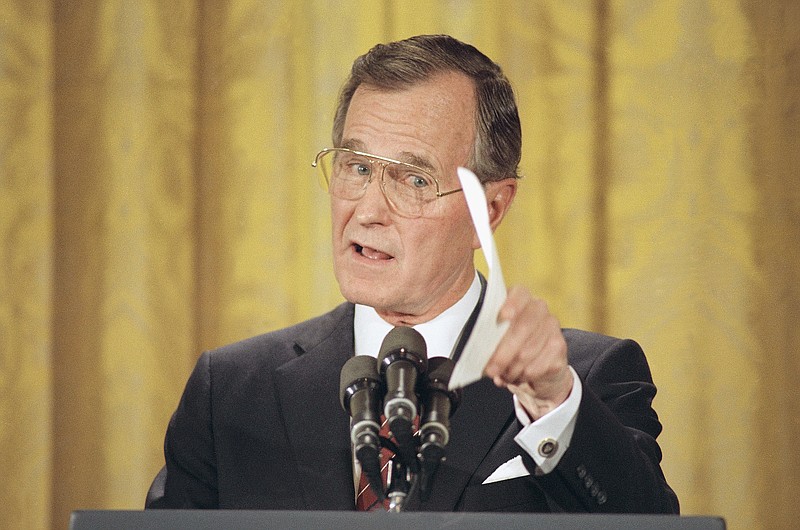It was presidential candidate George H.W. Bush's greatest campaign moment, and the occasionally stumble-worded candidate delivered speechwriter Peggy Noonan's words of his 1988 Republican National Convention acceptance speech flawlessly.
"My opponent won't rule out raising taxes," he thundered. "But I will. And the Congress will push me to raise taxes, and I'll say no. And they'll push, and I'll say no, and they'll push again, and I'll say to them, "Read my lips: no new taxes."
At that moment, many of the doubters of Bush's ability to wear President Ronald Reagan's vaunted mantle became convinced. By invoking the tough Clint Eastwood-esque language, he convinced Republicans he was a true believer. They could now in good conscience vote for him.
The 17-point lead in the race held by Democratic candidate Michael Dukakis at the end of the previous month's Democratic National Convention would soon wither to nothing. By September, the then-vice president was up in the polls, and he won the race easily.
In 1990, with the country in a brief recession and the Democrats in control of Congress rejecting steep spending cuts, Bush felt he had to break his promise and agreed to what were euphemistically called "tax revenue increases." The broken pledge followed him as he campaigned for re-election in 1992 and is cited by historians as one of the causes of his loss to Democrat Bill Clinton.
In 2015 and 2016, Republican Donald Trump made a presidential candidate name for himself with his advocacy of a border wall to stymie the influx of illegal immigrants.
In a speech announcing his candidacy, he said he would "build a great, great wall on our Southern border. And I will have Mexico pay for that wall. Mark my words."
Late in the campaign, Trump said, "For those here today illegally who are seeking legal status, they will have one route and only one route: to return home and apply for re-entry under the rules of the new legal immigration system."
In addition to the wall, he also has called for ending chain migration (when immigrants are allowed to bring distant relatives to the U.S.), eliminating the visa lottery and beefing up resources for border security.
On Tuesday, Trump appeared to dangle both the permanent legalization of the so-called "Dreamers" (illegal immigrant children brought to the U.S by illegal immigrant parents) and the prospect of comprehensive immigration reform before a group of senior congressional leaders.
"If you want to take it that further step (comprehensive immigration reform), I'll take the heat," he said. "I'll take the heat off of both the Democrats and the Republicans. My whole life has been heat. I like heat, in a certain way."
We would advise Trump to walk very carefully here. Voters who gave him an upset victory in 2016 might swallow legalizing the "Dreamers," who are here through no fault of their own, but they would quickly abandon him if they thought he was giving in on considering making the more than 12 million illegal immigrants here legal.
After eight years of duplicitous policies under President Barack Obama - who, among other things, said he could not delay deportation of illegals, then did it- voters thought the New York businessman meant what he said about those persons who broke the law to come into the U.S.
If Trump breaks his "read my lips" policy on illegal immigrants, Republicans can kiss control of Congress in the 2018 mid-term elections and any chance he would have of re-election in 2020 goodbye.
They would react similarly to 2012 when many GOP voters, very unhappy with Obama but unable to warm up to GOP opponent Mitt Romney, stayed home. Thus, Obama became the first president in U.S. history re-elected to his second term with fewer votes than his first. (Popular vote totals were not kept until 1824.)
Both Trump and Congress are staring at deadlines - Friday to pass a spending measure to avoid shutting down the federal government and March 5 to officially end the DACA (Deferred Action for Childhood Arrivals) program. Trump's openness last week indicates he's willing to deal; Democrats have shown no such openness. They want a bill to legalize the young illegals without tying it to chain immigration, the visa lottery or any security that references a "wall."
Indeed, Democrats even have shown indications of holding up a bill to fund the government to get a clean DACA bill. We think they'd be foolish to do it and that the American people would hold them responsible, but such has been their rhetoric.
As for Trump, he was all over the map in his meeting with congressional leaders.
He called potential DACA legislation a "bill of love" and said "we'd like to see this get done," but also said a new border wall must be in whatever legislation emerges and endorsed a bill expected to be introduced in the House last week that would give him many of the immigration security measures he has been seeking.
So, negotiations in Washington, D.C., this week may resemble a political game of chicken, but we hope Trump remembers those who gave him the privilege to play the game.
Indeed, he might well recall former President Bush's later regret of breaking his no new taxes pledge.
"If I had it to do over," he told the Atlanta Journal in 1992, "I wouldn't do what I did then I did it, and I regret it."
